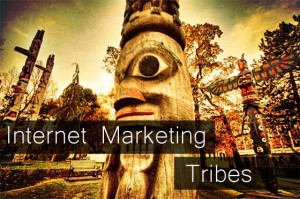Tribe marketing is more of a descriptive title rather than an official name. In a sense, being tribal just means that we as a society take our cues from the group (or tribe) that we most relate to. For example, if you’re close to the entertainment industry, you’re more likely to follow trends that current celebrities are following or creating.
In terms of websites and/or blogs, it’s important to know what tribe you belong to or what tribe you’re creating.  For a website example, lets look at my site. The most closely related tribal group I can relate to would be business owners, bloggers, website developers and Internet marketers. What this means is that my content will strike a chord with people in these groups and they’re more likely to respond to my offerings.
For a website example, lets look at my site. The most closely related tribal group I can relate to would be business owners, bloggers, website developers and Internet marketers. What this means is that my content will strike a chord with people in these groups and they’re more likely to respond to my offerings.
What is tribe marketing?
As with any marketing, you want to focus your attention on your niche group(s). Although one of your primary goals is to get as much traffic to your site as possible, what good is a bunch of visitors looking for ways to soup up their hotrods when your site is based on search engine optimization? Your site however, would be of some use to the person running a site about hotrods.
Because people are “tribal” by nature, they are looking to fit in with people who share the same interests and want the same things in life–as well they should be. Your goal is to maximize your site’s potential using these groups of people.
Ways to market
In the next few sections, I’ll be exploring ways to accomplish this goal, but here’s a quick snapshot:
- Create a forum – Using a forum (message board) allows you to interact with your visitors as well as letting them interact with each other.
- Blog comments – Allow visitors to comment on your posts to create dialog.
- Use groups – Use web groups all over the Internet that group similar people together to promote your website to.
If you have passion about your website, you’re probably already doing these things and understand the value of them. Think about it this way: if you went to an online store that sold something you can’t buy anywhere else, how much better would it be if you went to the product page and right alongside the standard description, you got to see other people’s opinions on it, some forum posts about how to customize that product and even a live contact link straight to the owner!
Not only would this make you feel better about the product, but you’re likely to come back and buy other things as well.
My two cents
Utilize the way people communicate and interact with other people. You’d be surprised how much more 100 visitors of targeted traffic is worth compared to 1000 random visitors. Spend your time looking for people that are looking for you and don’t get so caught up with just trying to get your traffic numbers up.
| << Back to Feedburner | Forward to Forums >> |